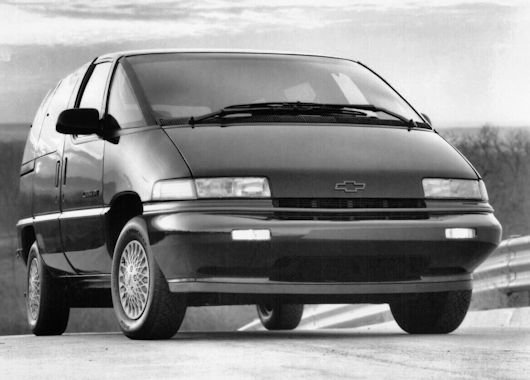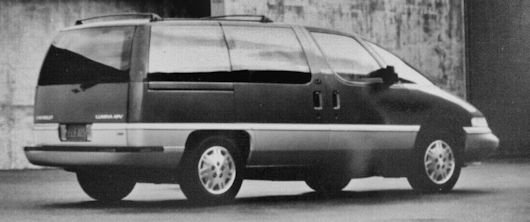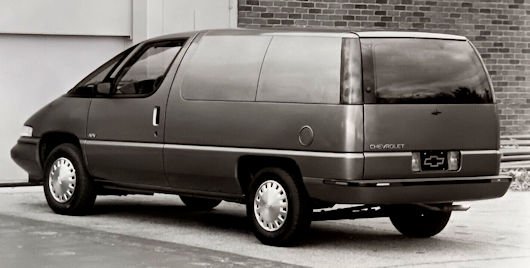Chevrolet Lumina APV
 |
|
|
Production period: |
1990 to 1996 |
|
Class: |
Motor Car, Commercial vehicle |
|
Body versions: |
station wagon SUV |
|
Engines: |
Gasoline: 3.1-3.8 Liters (90-134 kW) |
|
Transmission |
3-4 speed auto |
|
Length: |
4933 mm |
|
Width: |
1877 mm |
|
Height: |
1656-1669 mm |
|
Wheelbase: |
2789 mm |
|
Curb weight: |
1632-1769 kg |
The Chevrolet Lumina APV was a van made by Chevrolet, a GM division, in the model years 1990 to 1996. The sister models of the Lumina APV were the Pontiac Trans Sport and the Oldsmobile Silhouette.
History
General Motors' first attempt to build a van to compete with Dodge Caravan and Plymouth Voyager, the Chevrolet Astro and its twin GMC Safari, failed to materialize in Chrysler's nearly complete dominance of the van market in the late 1980s change, so you started a second attempt. The Lumina APV was released as part of a planned complete Lumina series, which then actually consisted only of a sedan and this same van. APV stands for "All Purpose Vehicle". The car itself was transformable and showed some technical innovations, but the unfamiliar "spacey" exterior could not convince the Van customers.seating for up to seven, front-wheel-drive and the largest use of composites on a production vehicle. The Lumina APV also is a performer with a standard 3.1 liter V6 engine with electronic fuel injection, 3-speed automatic transmission with overdrive,F41 suspension, power steering and power brakes.
The cars were assembled in the now-defunct GM factory in Tarrytown, New York, and were based on the GM-U platform, which consisted of a galvanized steel frame (“spaceframe”) combined with fiberglass body panels. which were resistant to rust and minor damage. This production technology was developed for the Pontiac Fiero and was largely used by GM for the products of its Saturn Division. The vehicle also components shared with the GM-A - platform.
The Lumina APV was available as a seven-seater, with the five rear seats were light (15.4 kg) and arbitrarily in the cargo area combined. As of 1994, there were optional built-in child seats, which opened the possibility to make two of the rear seats with a pull on an attached lever from adult to child seats.
The Lumina APV was the only one of the three sister models available as a delivery van. He had rubber mats instead of carpets, no back seats, and painted plastic inserts instead of the rear side windows.
On request, the cars were equipped with a levelling system consisting of inflatable rear shock absorbers and a small compressor. This allowed the wagons to be regulated to the correct level, regardless of the load. In addition, a supplied hose allowed to inflate the tires or sports and play equipment.
First, a 3.1-liter V-6 engine was used, which gave a maximum power of 120 hp (90 kW) and was rated as adequate by the press.

1991
- Customer complaints about reflections of the enormous dashboard in the windshield lead to the installation of a black carpet on the dashboard instead of the previous plastic surface.
1992
- This year, Buick's 3.8-liter V6 engine with 127 kW was new in combination with an electronically controlled, 4- speed 4T60-E automatic transmission.
- The radio antenna mast mounted in the area of the bulkhead disappeared and was replaced by a roof antenna between the sheet metal roof and the headliner.
- The fixed rearview mirrors were replaced with moving ones, which were also bigger.
- The brakes were enlarged and equipped with ABS as standard.
In the 1992 model year, the Lumina APV and its sister models also got an optional Buick 3.8L V6 engine with a maximum output of 170 hp (127 kW). This engine developed significantly more torque and accelerated the car better at what they did to the Vans their time until the Ford Windstar came strong with its maximum of 200 hp (149 kW) 3.8-liter V6 engine in Model year 1996 came out.
1993
- A remote-controlled, electric sliding door was indeed announced, but only produced in the following year.
- A redesigned centre console with larger switch for the air conditioning and large shelves was added.
1994
- The styling of the car was revised and the nose shortened by 75 mm, the headlamps of the Pontiac Bonneville used and the A-pillars no longer black, but painted in body colour, so that the cars look like the competition products.
- In order to make the distance between the dashboard edge and lower edge of the windshield appear lower, the dashboard has been provided with an additional edge.
- The electric sliding door (see 1993) was introduced as an extra in the production.
- Built-in child seats in the second row of seats were available on request.
- Also, on request there was a traction control.
- The darkened rear windows were even more coloured.
- An airbag on the driver's side was standard.
From the 1994 model year, there were remote-controlled, electric sliding doors. In the 1994 and 1995 model years, traction control was available along with the 3.8L V6 engine.
The design of these vans was discussed very controversially. When the Chevrolet Lumina APV and its sister models were designed, no one had yet tested the marketing of sporty vans, but GM was thought to be a big market segment. The vans were engineered to be lower and sleeker than any comparable brand of other makes in the market. The long and gently sloping windshield and the resulting large distance to the lower edge made for an unfamiliar driving feel, until the driver had become accustomed to the changed dimensions. In response to the buyers' criticism of the avant-garde styling of the vehicles (and annual production figures that were about 50% to 1992 below those expected by General Motors 150,000-200,000 vehicles), the ratings of potential buyers, publications in Motor magazines and even Häme in the advertising films of Chrysler it was decided in 1994 to give the Lumina APV and the Trans Sport a facelift. The nose was shortened by 3 "(75 mm) and the A-pillars were no longer painted black to give the car a more conventional look. Additionally, there was an edge inside on the dashboard to reduce the visible distance to the windshield bottom.
1995
- Electric door locks, which unlock with the parking function of the automatic transmission and automatically lock in any other position of the selector lever, were introduced as a standard function in the optional door lock package.
1996
- Last year of production. The APV was replaced by the venture.
- The 3.1-liter and 3.8-liter V6 engines dropped out of production, becoming the 3.4-liter V6 engine with 180 hp (134 kW) of maximum power and a maximum torque of 277 Nm the only available engine.
- The traction control was no longer available.
The production of these vans was discontinued in 1996 and the plant in Tarrytown, which existed since 1900, closed and demolished. The Lumina APV has been replaced by the Venture, a brand-new vehicle with conventional steel frame monocoque and ordinary styling.

Technical
-
-Note: Advanced Maintenance and Repair Manuals available for registered users-
